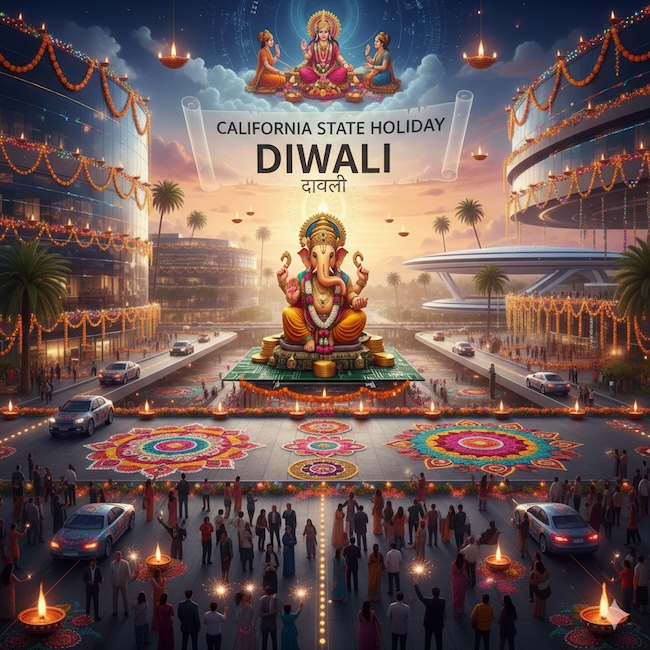Indian Americans Flex Tech Muscle with California Diwali Bill
By Romen Basu Borsellino | 19 Sep, 2025
A bill to make Diwali California’s newest state holiday hints at Indian American clout in wealthy Silicon Valley.
Any diehard fan of NBC’s The Office likely has at least a basic understanding of Diwali. Mindy Kaling both penned and starred in the third season episode that spotlights the annual Hindu festival of lights.
(Image by Copilot)
But soon, residents of the largest state in the country may no longer be forced to rely on a network TV show to learn about one of the biggest holidays in the world, celebrated by over one billion people.
This past week the California legislature passed AB 268, which would make Diwali a state Holiday, joining eleven other holidays.
The bill would give nonessential state employees the day off of work. It would allow most schools the option of closing and also encourage them to teach students about Diwali, which is a multi-day celebration, often in early fall, during which observers typically light candles and sparklers to symbolize the triumph of lightness over dark.
The bill is now on California Governor Newsom’s desk to be signed into law
While Newsom has not publicly given any indication of whether or not he intends to sign the bill, there is no shortage of reasons why the answer would be yes.
Newsom’s Decision
The bill was passed by Newsom's own party, the Democrats, who not only control both the state assembly and state senate but hold veto-proof majorities, which theoretically means that they could reverse Newsom’s decision even if he did refuse to sign the bill, which passed on a bipartisan basis.
That said, while they have frequently had the opportunity, the California legislature hasn’t overridden a governor’s veto since 1979, a tradition largely born out of both party loyalty and fear of retribution from the Governor.
California governors also happen to have an uncharacteristically high veto rate. In recent years, Newsom has vetoed approximately 18% of all pills passed.
While a governor’s decision of whether or not to sign a bill should of course rest solely on the merits of the legislation, it’s safe to assume that politics are frequently a motivating factor.
In this case, that would certainly bode well for advocates of the bill.
It’s no secret that Newsom is eyeing a presidential run in 2028. To be successful, he'll need a boatload of cash.
And it just so happens that Indian Americans have the highest income of any demographic in the United States. It’s also no coincidence that the wealthiest congressional district in the United States — which happens to be in California —happens to be represented by an Indian American.
Congressman Ro Khanna represents CA-17, the district that encompasses SIlicon Valley, home to a tech industry that's over one-third Indian American.
The district is also heavily Democratic, having voted 71% to 29% for Newsom over his Republican opponent in the 2022 California Governor’s race.
Simply put, Newsom could not afford to alienate such a wealthy base of Democratic voters from his home state should he seriously aspire to win the presidency.
And Khanna’s district is certainly not the only one.
Indian Political Power
There are a number of practical reasons to make Diwali a state holiday, along with the mere fact that codifying the day will inevitably lead to a greater awareness from non-Indian Americans.
But the move is also symbolic. It’s a show of Indians’ political power.
In 1956, California became the first state in the country to send an Indian American —who was also the first Asian American — to Congress by electing Democrat Dalip Singh Saund.
Decades later, with the 2016 election of Kamala Harris, California became the first state to send an Indian American to the US Senate.
Indian American political power continues to grow elsewhere in the country.
On Tuesday and Wednesday of this week, South Asians gathered in Washington DC to flex their national political muscle. The political action committee South Asian Impact, held its annual summit and gala in DC.
According to the organization, this is “the leading national event for South Asian American changemakers—bringing together elected officials, organizers, advocates, and community leaders.”
The multi-day activities include panels composed of elected officials like Ro Khanna, Ami Berra and Pramila Jayapal, as well as a full day of lobbying on Capitol Hill, which will give South Asians the opportunity to meet with elected officials about issues important to them.
Meanwhile, Indian American Zohran Mamdani is on the cusp of becoming the next Mayor of New York and Republican Vivek Rmaswamy is the front-runner to become the next Governor of Ohio, a stat that’s over 75% White.
California’s Diwali bill was sponsored by Assemblymember Ash Kalra, who is both the first Indian and Hindu to serve in the state assembly.
Per Kalra, “Designating Diwali as an official state holiday not only recognizes the festival’s religious and historical importance but will better enable those throughout the Indian diaspora and beyond to take part in one of the world’s oldest religious holidays.”
California would join Texas and Pennsylvania in recognizing Diwali as a holiday. While likely unintentional, there would certainly be some symbolism in a blue state, a red state, and a purple becoming the first three to do so.

(Image by Gemini)
Articles
Asian American Success Stories
- The 130 Most Inspiring Asian Americans of All Time
- 12 Most Brilliant Asian Americans
- Greatest Asian American War Heroes
- Asian American Digital Pioneers
- New Asian American Imagemakers
- Asian American Innovators
- The 20 Most Inspiring Asian Sports Stars
- 5 Most Daring Asian Americans
- Surprising Superstars
- TV’s Hottest Asians
- 100 Greatest Asian American Entrepreneurs
- Asian American Wonder Women
- Greatest Asian American Rags-to-Riches Stories
- Notable Asian American Professionals

